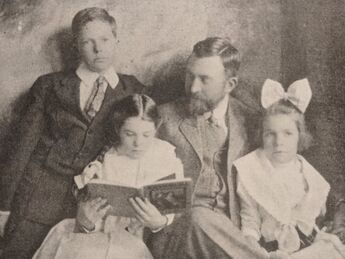
William Elmer Harmon was a real-estate mogul and philanthropist from Lebanon, OH. Harmon knew the American dream was to own land and your own home and made this dream accessible to the everyday individual. He devised a plan so that even low-wage earners could buy property with $2 in cash and the promise to pay a few cents a week. Harmon said, “It is simply the installment plan applied to real estate and I am sure it will work.” He enlisted the help of his brother, Clifford, and his mother’s brothers to found the first ever sub-division. It was called Branch Hill and was located just south of Loveland, Ohio. This type of real estate sales was new to the market and became a huge success. The Branch Hill sub-division would sell out its 200 lots in four days. By 1913 his real estate company had offices all over the United States and was the biggest real estate firm in the world. Harmon's firm was also responsible for developing much of Brooklyn.
For the last 30 years of his life, Harmon shared his wealth with the people of America beginning with his home – Lebanon, Ohio. He established over 120 Harmon parks across the United States, and created an endowment, the Harmon Civic Trust, to maintain the properties. Harmon Hall (now Harmon Museum) was built in 1913, as a recreational facility, and donated to the City of Lebanon. (Learn more about the history of Harmon Hall, as well as our other properties, here.) “Some men keep a racing stable or a yacht. I have much more fun spending my money in helping people to help themselves.” - William, Elmer Harmon. It was Harmon's idea of fun that created the Harmon Foundation in support of individuals interested in fine art, literature, music, education, race-relations, sciences (etc.). The foundation would give them the start they might not have otherwise had and was a key factor in the Harlem Renaissance, in support of African-American art (the Harmon Foundation would hold yearly exhibitions showcasing African-American artists.)
Harmon was “on a mission to bring a smile and a tender thought in high and low places, to comfort and cheer those who do exceptional things or suffer.” "Serving one's own people," he added, “transcends duty... and becomes a privilege."
We are honored for our building to carry the name of such an influential and giving man.
For the last 30 years of his life, Harmon shared his wealth with the people of America beginning with his home – Lebanon, Ohio. He established over 120 Harmon parks across the United States, and created an endowment, the Harmon Civic Trust, to maintain the properties. Harmon Hall (now Harmon Museum) was built in 1913, as a recreational facility, and donated to the City of Lebanon. (Learn more about the history of Harmon Hall, as well as our other properties, here.) “Some men keep a racing stable or a yacht. I have much more fun spending my money in helping people to help themselves.” - William, Elmer Harmon. It was Harmon's idea of fun that created the Harmon Foundation in support of individuals interested in fine art, literature, music, education, race-relations, sciences (etc.). The foundation would give them the start they might not have otherwise had and was a key factor in the Harlem Renaissance, in support of African-American art (the Harmon Foundation would hold yearly exhibitions showcasing African-American artists.)
Harmon was “on a mission to bring a smile and a tender thought in high and low places, to comfort and cheer those who do exceptional things or suffer.” "Serving one's own people," he added, “transcends duty... and becomes a privilege."
We are honored for our building to carry the name of such an influential and giving man.
Office Phone: 513 932-1817
Email: [email protected]
Email: [email protected]
Wchs Office/Harmon MuseumTues - Sat: 10am - 4pm
Year Round |
1795 BEEDLE cABINPhone for hours
Year Round |





